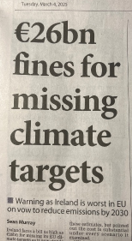FINES FOR FAILURE TO CUT GREENHOUSE GASES MAY COST IRELAND €26bn
Ireland faces a fine of €26 billion if it doesn’t act swiftly to avoid missing legally binding climate targets, a recent report has warned the government. However, the fine can be reduced from €26.4 billion down to €3.4 billion or at most €7.5 billion, if urgent and effective climate action measures are taken now.

Irish Fiscal Advisory Council chair Seamus Coffey, speaking on March 3rd said it is a “clear case of being able to reduce a massive fiscal risk in a way that doesn’t threaten the wider sustainability of the public finances.”
While the threat of ruinous high fines is frightening, the threat from global warming itself, especially if CO2 tipping points are exceeded, is unthinkable.
ON EARTH DAY 22ND APRIL 2016 THE ‘PARIS AGREEMENT’ WAS SIGNED
On Earth Day, 22nd April 2016, the landmark climate change agreement, called the ‘Paris Agreement’ was signed by the United States, the United Kingdom, China, and 120 other countries, including Ireland. However, many fossil fuel based industries are strongly resisting the measures needed for a transition to clean renewable energy. To highlight the potential of renewable energy, the theme of this year’s Earth Day on this 22nd April is ‘Our Power, Our Planet’.

PERU DEPENDS ON GLACIERS FOR A STEADY SUPPLY OF FRESH WATER
A Peruvian farmer has decided to make a stand, before increased glacial melt water destroys his livelihood. Glaciers are an important source of fresh water in Peru, where streams have been fed by the summer melt water from these glaciers for millennia. One impact of global warming has been the accelerated rate of glaciers melting in these high mountain ranges. In the long term, the demise of such critical glaciers spells disaster for communities with no alternative sources of fresh water. And in the short term, the rapid melting of glaciers creates the risk of flooding as torrential water flow becomes unmanageable.

PERUVIAN FARMER GIVES LEADERSHIP IN THE FIGHT FOR CLIMATE JUSTICE
This Peruvian farmer, Saúl Luciano Lliuya, has filed a lawsuit against the German energy giant RWE. Sául holds that RWE’s immense emissions threaten his family, his property, and his home city of Huaraz. The long-awaited hearing took place on 17 and 19 March 2025 at the Higher Regional Court in Hamm.
Saúl Luciano Lliuya – who farms in the Andes – and with him more than 50,000 inhabitants of the Andean city of Huaraz are acutely threatened by floods due to global warming. A glacial lake above the city has grown threateningly due to glacial melt. An ice avalanche could cause the lake to overflow and trigger a destructive tidal wave.
Saúl Luciano Lliuya, on November 24, 2015, filed a lawsuit against the energy company RWE in a German civil court. As one of the largest CO2 emitters in Europe, RWE, the legal case argues, is partly responsible for the climate crisis and the threat posed by the floods which threaten Huaraz.
Saúl Luciano Lliuya is concerned about the urgently needed protection for himself, his family as well as the poor people in Huaraz, who have contributed little or nothing to the climate crisis.
MEANWHILE, WHAT CAN PARISHES DO TO HELP FARMERS HERE & IN PERU?
Nobody wants to see taxpayers’ money going to pay penalties which Ireland may incur. Hence we need radical reductions in greenhouse gas emissions to take place before 2030. And nobody wants to see farming made any more difficult than it already is, by a total breakdown of the climate due to man-made inaction.
One (of many) measures which can be part of the solution to global warming is to plant more trees. Trees sequester carbon dioxide, and emit oxygen. Growing timber effectively locks away CO2, the most common greenhouse gas. Trees have many other benefits too, such as attenuating floodwaters, preventing loss of soil in heavy downpours, creating habitats for biodiversity, and providing shelter for livestock.
In tillage areas, awkward corners of fields, sometimes called ‘hare’s corners’, can serve as areas for tree planting. It is time to look at any glebe land or other available lands, and ask are there places where trees might be planted, so that the Church can be (even a small) part of the solution to global warming?

HUMANITY FACES CHALLENGES, BUT WITH GOD, NOTHING IS IMPOSSIBLE
Despair paralyses, whereas hope motivates action. Christians live by the hope that with God, through Jesus Christ, nothing is impossible, (Luke 1:37, Matthew 19:26, Philippians 4:13). To survive global warming, humanity will need to leave fossil fuels in the ground, and learn to appreciate, many more trees, as Isaiah 55:12 prophesies: ‘For you shall go out with joy, and be led out with peace. The mountains and the hills will break out before you into singing; and all the trees of the fields will clap their hands.’
